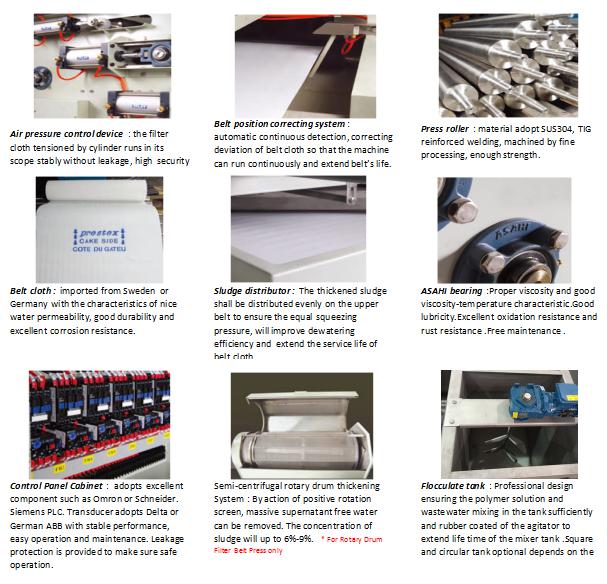Rotary Drum Sludge Thickener FDT Series
Introduction
Description
Thickening is often the first step in a sludge treatment process. Sludge from primary or secondary clarifiers may be stirred (often after addition of clarifying agents) to form larger, more rapidly settling aggregates. Primary sludge may be thickened to about 8 or 10 percent solids, while secondary sludge may be thickened to about 4 percent solids. Thickeners often resemble a clarifier with the addition of a stirring mechanism.Thickened sludge with less than ten percent solids may receive additional sludge treatment while liquid thickener overflow is returned to the sewage treatment process.
FDT Series is Widely used prior to belt press, plate filter press , centrifuge and other kinds of sludge dewatering units in municipal and industry wastewater treatment .
Features
FDT Rotary Drum Thickener
1. Main structure made of stainless steel.
2. Cylinder tensioning device. Integrated dewatering system, continuous auto running;
3. Optional of stainless steel and polyester for drum sieve belt cloth.
4. No operation fault as bearings adopt tin bronze (graphite) self-lubrication copper sleeve
5. Low Power consumption : power requirement and greenhouse gas emissions, even including washwater booster pumps, are typically 20% ~30% of other sludge dewatering unit .
6. Widely used prior to belt press, plate filter press , centrifuge and other kinds of sludge dewatering units.
7. Polymer rate : Offers the lowest possible polymer dosage rate
8. Enclosed : To fit covers around all the zones of the unit so that ensure the worksite clean .
SFC Rotary Drum thickener mechanism
1. Sludge pump into the mixing reaction tank, sufficiently stir and fully mixed with the polymer solution from polymer dosing system.
2. Sludge is rapidly flocculate into large particles by the fine particles, and large-group flocs formed into the network structure, then flow into the rotating drum .
3.Most of the free water is released through the filter cloth of the drum . Reach the purpose of pre-dehydration .

Application Field

Technical Data Sheet
Thickening is often the first step in a sludge treatment process. Sludge from primary or secondary clarifiers may be stirred (often after addition of clarifying agents) to form larger, more rapidly settling aggregates. Primary sludge may be thickened to about 8 or 10 percent solids, while secondary sludge may be thickened to about 4 percent solids. Thickeners often resemble a clarifier with the addition of a stirring mechanism.Thickened sludge with less than ten percent solids may receive additional sludge treatment while liquid thickener overflow is returned to the sewage treatment process.
FDT Series is Widely used prior to belt press, plate filter press , centrifuge and other kinds of sludge dewatering units in municipal and industry wastewater treatment .
Features
FDT Rotary Drum Thickener
1. Main structure made of stainless steel.
2. Cylinder tensioning device. Integrated dewatering system, continuous auto running;
3. Optional of stainless steel and polyester for drum sieve belt cloth.
4. No operation fault as bearings adopt tin bronze (graphite) self-lubrication copper sleeve
5. Low Power consumption : power requirement and greenhouse gas emissions, even including washwater booster pumps, are typically 20% ~30% of other sludge dewatering unit .
6. Widely used prior to belt press, plate filter press , centrifuge and other kinds of sludge dewatering units.
7. Polymer rate : Offers the lowest possible polymer dosage rate
8. Enclosed : To fit covers around all the zones of the unit so that ensure the worksite clean .
SFC Rotary Drum thickener mechanism
1. Sludge pump into the mixing reaction tank, sufficiently stir and fully mixed with the polymer solution from polymer dosing system.
2. Sludge is rapidly flocculate into large particles by the fine particles, and large-group flocs formed into the network structure, then flow into the rotating drum .
3.Most of the free water is released through the filter cloth of the drum . Reach the purpose of pre-dehydration .

Application Field

| Specification | FDT Series Rotary Drum Thickener | |||||||
|---|---|---|---|---|---|---|---|---|
| FDT-20 | FDT-25 | FDT-35 | FDT-40 | FDT-50 | FDT-70 | FDT-100 | ||
| Filter Opening(micron) | 30~80 | 30~80 | 30~80 | 30~80 | 30~80 | 30~80 | 30~80 | |
| Treating Capacity (m3/hr) SS 0.4%~3 % | 7.5~20 | 12~25 | 15~35 | 20~40 | 30~50 | 35~70 | 50~100 | |
| Dried Sludge D.S.(Kg./hr) | 90~200 | 120~250 | 150~350 | 200~400 | 300~500 | 350~700 | 500~1000 | |
| Sludge outlet concentration (%) | 3.5~11 | 3.5~11 | 3.5~11 | 3.5~11 | 3.5~11 | 3.5~11 | 3.5~11 | |
| Power Consumption (KW) | Driving Motor | 0.37 | 0.55 | 0.75 | 0.75 | 0.75*2 | 1.1*2 | 2.2*2 |
| Thickener Motor | 0.37 | 0.37 | 0.55 | 0.55 | 0.37*2 | 0.55*2 | 0.75*2 | |
| Washing pump * | 0.75 | 0.75 | 1.125 | 1.125 | 1.5 | 1.5 | 1.5 | |
| Filtrate Collecting Tray | YES | YES | YES | YES | YES | YES | YES | |
| External Dimension (mm) | Length | 3600 | 4100 | 4200 | 4700 | 4100 | 4200 | 4700 |
| Width | 1200 | 1200 | 1500 | 1500 | 2100 | 2500 | 2500 | |
| Height | 1800 | 1800 | 2050 | 2050 | 1800 | 2050 | 2050 | |
| Reference Weight (kgs) | 450 | 700 | 1200 | 1600 | 2800 | 3200 | 3800 | |
| * Washing pump for optional | ||||||||
TOP




